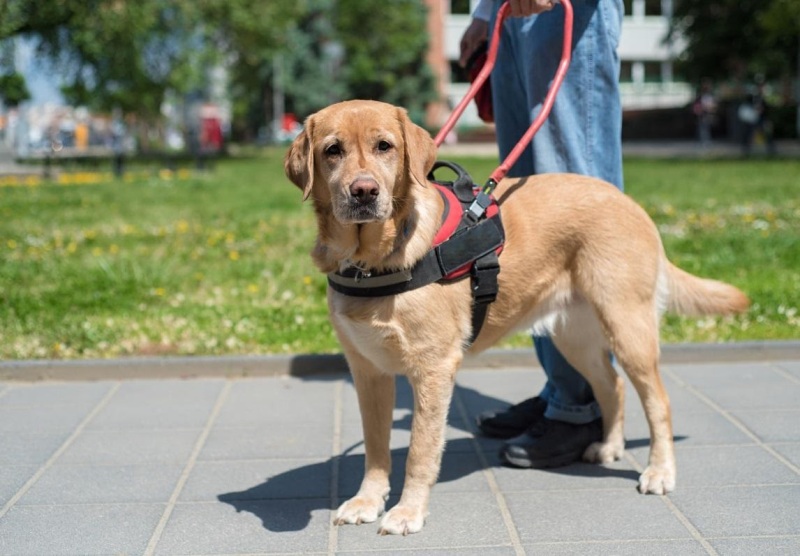
Trained Dogs for Sale: 5 Important Things to Know Before You Buy a Trained Service Dog
Are you considering purchasing a service dog?
We’re all familiar with the saying “a dog is a man’s best friend”. But, as it turns out, a dog can be more than a simple best friend to some. This is what separates your standard four-legged friend from a certified therapy dog.
For those with a physical or mental impairment, therapy dogs can become a crucial part of one’s everyday routine. This could include anything from turning on lights and fetching medication to carrying supplies and helping to provide guidance when crossing a busy intersection.
So, what are the must-know facts if you’re thinking of purchasing a service dog of your own? We’re outlining the five most important facts that every owner must be aware of when considering trained dogs for sale.
Let’s get started!
1. What Is a Service Dog?

So, what exactly separates a service dog from any other dog?
Remember, a service dog is more than just a pet. Instead, a service dog is one who is individually trained to do work or provide services and support to people with disabilities. The ultimate goal is for the dog to lessen the effects of the disability and heighten that person’s quality of life and overall safety.
For example, a service dog trained in epilepsy could help to alert and give warning to its owner before having a seizure. This could provide that person with enough time to contact a friend or family member and ensure he or she is in a safe and protected environment.
In this sense, service animals are defined as working animals rather than pets. The training the dog has received will be directly correlated to provide service and support to a specific variety of disabilities or conditions.
2. Who Qualifies?
Next, it’s essential to understand the qualification requirements for a service dog.
Your first step should always be to ensure that you can qualify for a service dog. Remember, different states may have different rules as to who can qualify. It’s always important to check the rules and regulations of your specific location.
In general, nearly anyone with a disability can qualify for a service dog. While there’s no specific set of criteria, you will have to document your disability. You may have to outline the ways in which you anticipate having a service dog to benefit your everyday life and routine.
It’s also important to screen yourself. For example, you’ll want to consider whether you have the time, money, and mobility to provide for an animal. Can you afford an unforeseen medical expense?
Do you have the ability to exercise the dog or hire someone to do so? These are all important questions that must be considered before making an official decision.
3. Is the Dog Officially Trained?
What is the level of training that the dog has received?
When searching for certified therapy dogs, it’s important to inquire as to what type of official training the dog has received. You’ll also want to ensure that this training is legitimate and can be proven via documentation.
Far too often, illegitimate companies offer “trained” service dogs for sale at a reduced rate. Although they’re being marketed as trained animals, the training that they have received is unofficial and unprofessional. In this event, the services that these dogs can provide are extremely limited.
To avoid falling victim to such a scam, be upfront in asking a number of questions to the breeder or the service provider. If their service dogs are legitimate, they will be happy to provide you with the details and documents to support such legitimacy.
4. What Services Does the Dog Offer?

What is the main service or support that you anticipate receiving from your therapy dog?
Generally speaking, service dogs offer a wide variety of specializations. This could include anything from assisting with those that are visually impaired or suffering from diabetes to those suffering from post-traumatic stress disorder. When we consider that 3.5% of U.S. adults suffer from PTSD, it’s easy to see why service dogs are in such high demand.
While many dogs are trained in a number of specializations and disabilities, it’s important to ensure that you’re choosing the right one for you. This is another reason that working with an official and legitimate service dog company is so crucial. They will use their expertise and pair you with a dog that specializes in your disability or condition.
5. What Are Your Rights?
Once you are paired with a certified therapy dog, what are the rights you possess as an owner?
For example, where can you bring your service dog and are there any limitations in place? Of course, some locales could have different rules and regulations than others. However, there is a general set of rights that apply to service dogs and their owners.
Generally speaking, service dogs are permitted to go anywhere that members of the public are allowed. This could be anywhere from the grocery store and restaurants to public parks and governmental offices. This also includes public transportation as well as airlines.
However, some sterile environments such as hospitals or clinics have the right to forbid service dogs. This is because animals, in general, can be a threat to the cleanliness and purity these environments strive toward maintaining.
In determining your rights, it’s also important to understand the difference between a service dog and an emotional support dog. As compared to a service dog, an emotional support dog carries fewer locational rights. This means they’re not as widely accepted in the public areas as listed above.
Trained Dogs for Sale
Today, there are over 500,000 trained service dogs in America.
If you think that you could benefit from a service dog, it might be time to research trained dogs for sale in your area. Not only can a service dog provide you with a much-needed companion, but they can help to make your life more convenient and safe. Who knows, a trained service dog just might, one day, save your life.
Did you find this article helpful? If so, feel free to bookmark our page and visit us again in the future!




